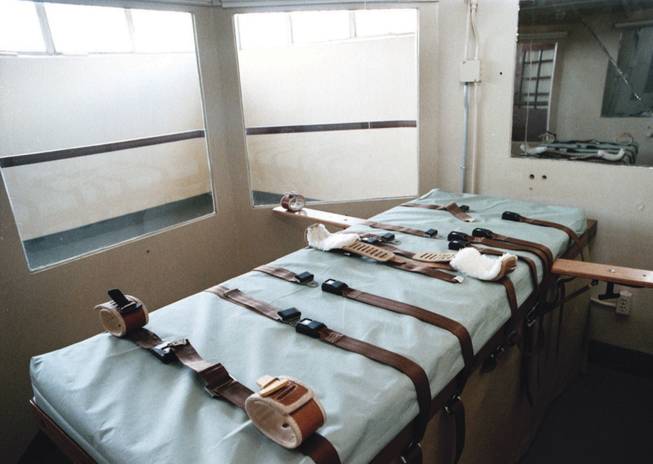
Cathleen Allison / Associated Press File
The execution chamber at Nevada State Prison in Carson City is rarely used, partly because many on death row die of natural causes before appeals are through.
Published Tuesday, April 13, 2021 | 4:07 p.m.
Updated Tuesday, April 13, 2021 | 6:10 p.m.
Related Content
A bill that would abolish the death penalty and convert sentences into life without the possibility of parole passed through the Nevada State Assembly today in what proponents described as a “historic vote.”
Assembly Bill 395 passed 26-16 along party lines, with no Republicans voting for the measure. It will head to the Senate Judiciary Committee, where Democrats hold a slimmer majority in the Senate than they do in the Assembly.
“This is a historic moment for Nevada,” wrote American Civil Liberties Union of Nevada’s policy director Holly Welborn in a news release. "For the first time, a retroactive death penalty abolition bill has passed the Assembly, and we are one step closer to ending this racist, barbaric practice.
“Now the Senate needs to take heed. The fight is only just beginning, and we will not rest until this bill is sent to the governor’s desk,” she added.
The last execution in Nevada, which has about 80 inmates on death row, came in 2006. Proponents of the legislation cite high costs through years of appeals — at least $500,000 by some estimates — racial disparities, the possibility of wrongful convictions, and hurdles to obtain the supplies needed to execute someone.
“We are absolutely thrilled with the Assembly’s momentous vote in favor of ending Nevada’s deeply flawed death penalty system,” wrote Nancy Hart, president of the Nevada Coalition Against the Death Penalty, in a news release. “Previous efforts to move measures like this forward have stalled, but this renewed effort is different.”
Prosecutors across Nevada, including Clark County District Attorney Steve Wolfson, have come out against the proposal. Other opponents say the "worst of the worst" convicted of first-degree murder deserve to pay with their lives.
In a floor speech, Assemblywoman Annie Black, R-Mesquite, noted that out of 1,126 prisoners serving time for first-degree murder, fewer than 7% were sentenced to death.
Black mentioned convicted murderer Javier Righetti, who raped, killed and then incinerated the remains of his victim, Alyssa Otremba, 15. “Javier Righetti’s guilt is not a question,” she said. “He gave Alyssa Otremba a death sentence; he should get the same.”
There’s also James Biela, who kidnapped and raped two women, killing Brianna Denison, who he attacked at a UNR parking garage in 2008.
“Bree was only 19 years old, with her entire life ahead of her,” Black said. “But James Biela gave her a death penalty. He should get the same, and the sooner the better.”
Proponents say that the drawn-out, costly process of executing someone delays the grieving process for families of the victims, who are more likely to see the killers die in prison before they’re executed.
Assemblyman Steve Yeager, D-Las Vegas, in presenting the bill, labeled the death penalty a “broken system.”
Yeager said more than 50% of the 189 death sentences imposed in Nevada’s history have been reversed, and that out of a dozen executions, only one of the prisoners died against his will.
“Nevada should join two-thirds of the world’s countries (that) have already banned the death penalty, many of whom have determined that it violates fundamental human rights,” Yeager said.
In closing remarks, Yeager quoted Ghandi: “An eye for an eye leaves the whole world blind.”
